中英禁忌语对比研究
汉英禁忌语对比分析
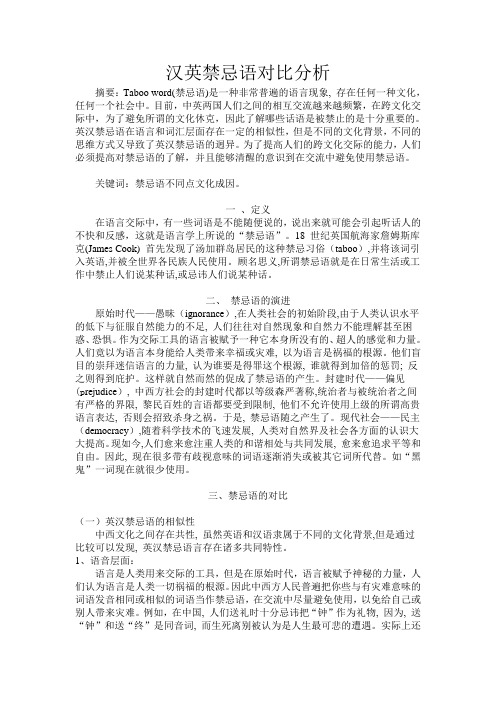
汉英禁忌语对比分析摘要:Taboo word(禁忌语)是一种非常普遍的语言现象, 存在任何一种文化,任何一个社会中。
目前,中英两国人们之间的相互交流越来越频繁,在跨文化交际中,为了避免所谓的文化休克,因此了解哪些话语是被禁止的是十分重要的。
英汉禁忌语在语言和词汇层面存在一定的相似性,但是不同的文化背景,不同的思维方式又导致了英汉禁忌语的迥异。
为了提高人们的跨文化交际的能力,人们必须提高对禁忌语的了解,并且能够清醒的意识到在交流中避免使用禁忌语。
关键词:禁忌语不同点文化成因。
一、定义在语言交际中,有一些词语是不能随便说的,说出来就可能会引起听话人的不快和反感,这就是语言学上所说的“禁忌语”。
18 世纪英国航海家詹姆斯库克(James Cook) 首先发现了汤加群岛居民的这种禁忌习俗(taboo),并将该词引入英语,并被全世界各民族人民使用。
顾名思义,所谓禁忌语就是在日常生活或工作中禁止人们说某种话,或忌讳人们说某种话。
二、禁忌语的演进原始时代——愚昧(ignorance),在人类社会的初始阶段,由于人类认识水平的低下与征服自然能力的不足, 人们往往对自然现象和自然力不能理解甚至困惑、恐惧。
作为交际工具的语言被赋予一种它本身所没有的、超人的感觉和力量。
人们竟以为语言本身能给人类带来幸福或灾难, 以为语言是祸福的根源。
他们盲目的崇拜迷信语言的力量, 认为谁要是得罪这个根源, 谁就得到加倍的惩罚; 反之则得到庇护。
这样就自然而然的促成了禁忌语的产生。
封建时代——偏见(p rejudice), 中西方社会的封建时代都以等级森严著称,统治者与被统治者之间有严格的界限, 黎民百姓的言语都要受到限制, 他们不允许使用上级的所谓高贵语言表达, 否则会招致杀身之祸。
于是, 禁忌语随之产生了。
现代社会——民主(democracy),随着科学技术的飞速发展, 人类对自然界及社会各方面的认识大大提高。
现如今,人们愈来愈注重人类的和谐相处与共同发展, 愈来愈追求平等和自由。
中英语言禁忌的不点及文化对比

二中英语言禁忌的不同点及文化对比1.隐私禁忌差异。
英语国的人非常重视个人隐私,对于他人的工资收入、年龄、体重、婚姻状况、宗教信仰等,都不能随便过问, 否则会被看作是对别人私生活的侵犯,是极为不尊重的行为。
英语中的“Mind your own business”(管好你自己的事情, 少管闲事.) 就鲜明地体现了这一点。
因此, 在同英语国家的人交谈时, 应注意以下语言禁忌: What is your income? (你的收入是多少?) How much did the hat cost you? (你的帽子花了多少钱?) How old are you? (你多大年纪?) Are you married single?? (你结婚了吗) How many kids do you have? (你有几个孩子?) Are you a Republican or a Democrat? (你是共和党人还是民主党人) What is your religion? (你信什么教) 相反,中国人对待隐私却并非如此看重。
中国文化建立在集体主义基础之上, 一个中国人不是一个个体, 而是群体中的一个成员。
中国人重视亲情,友情, 同时追求宽广坦荡的胸襟, 认为‘事无不可与人言’对中国人来说,问他人个人问题, 如你多大了?你在哪里工作?你结婚了吗?有对象了吗?你去哪里了?你吃饭了吗?是聊天的一种方式,也是一种友好关心的表示。
这与英语国家完全不同中英文化对待年龄问题的态度也截然不同。
在中国“老”是智慧、经验的象征。
如:老马识途、老当益壮、老骥伏枥、都是对老的赞赏之词。
人们称呼上了年纪的人为老教授、老寿星、老太太以表达尊敬、敬仰之情。
而在英语国家“老”就意味着不中用了、能力下降了。
所以老的甚至是“中年的”这样的词,也就成middle- aged(中年的)这样的词。
也就成了他们的语言禁忌。
在言谈中,对年龄有所暗示,如:You are sostrong at that age ! (按你的年纪, 你可真健康! ) 之类的话都将引起对方的不快。
英汉禁忌语比较的分析
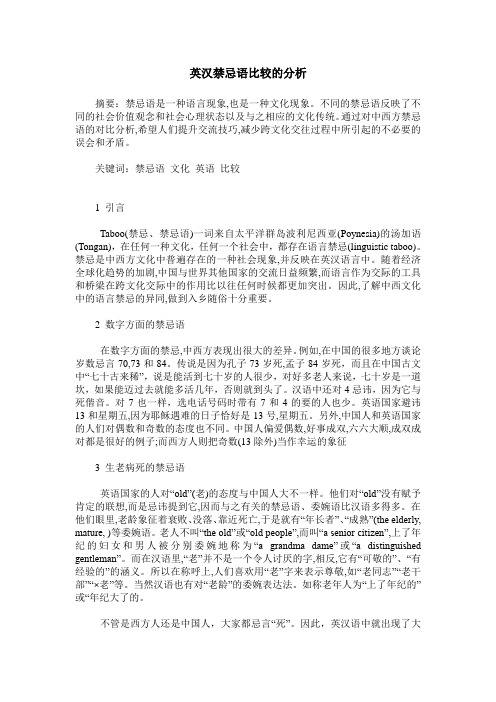
英汉禁忌语比较的分析摘要:禁忌语是一种语言现象,也是一种文化现象。
不同的禁忌语反映了不同的社会价值观念和社会心理状态以及与之相应的文化传统。
通过对中西方禁忌语的对比分析,希望人们提升交流技巧,减少跨文化交往过程中所引起的不必要的误会和矛盾。
关键词:禁忌语文化英语比较1 引言Taboo(禁忌、禁忌语)一词来自太平洋群岛波利尼西亚(Poynesia)的汤加语(Tongan),在任何一种文化,任何一个社会中,都存在语言禁忌(linguistic taboo)。
禁忌是中西方文化中普遍存在的一种社会现象,并反映在英汉语言中。
随着经济全球化趋势的加剧,中国与世界其他国家的交流日益频繁,而语言作为交际的工具和桥梁在跨文化交际中的作用比以往任何时候都更加突出。
因此,了解中西文化中的语言禁忌的异同,做到入乡随俗十分重要。
2 数字方面的禁忌语在数字方面的禁忌,中西方表现出很大的差异。
例如,在中国的很多地方谈论岁数忌言70,73和84。
传说是因为孔子73岁死,孟子84岁死,而且在中国古文中“七十古来稀”,说是能活到七十岁的人很少,对好多老人来说,七十岁是一道坎,如果能迈过去就能多活几年,否则就到头了。
汉语中还对4忌讳,因为它与死偕音。
对7也一样,选电话号码时带有7和4的要的人也少。
英语国家避讳13和星期五,因为耶稣遇难的日子恰好是13号,星期五。
另外,中国人和英语国家的人们对偶数和奇数的态度也不同。
中国人偏爱偶数,好事成双,六六大顺,成双成对都是很好的例子;而西方人则把奇数(13除外)当作幸运的象征3 生老病死的禁忌语英语国家的人对“old”(老)的态度与中国人大不一样。
他们对“old”没有赋予肯定的联想,而是忌讳提到它,因而与之有关的禁忌语、委婉语比汉语多得多。
在他们眼里,老龄象征着衰败、没落、靠近死亡,于是就有“年长者”、“成熟”(the elderly, mature, )等委婉语。
老人不叫“the old”或“old people”,而叫“a senior citizen”,上了年纪的妇女和男人被分别委婉地称为“a grandma dame”或“a distinguished gentleman”。
英汉禁忌语对比分析

3、功能
英汉禁忌语均具有维护社会秩序、遵循社会规范的功能。通过使用禁忌语, 人们可以避免谈论令人尴尬或冒犯的话题,从而减少不必要的冲突和摩擦。此外, 禁忌语还可以起到警示和教育的作用,提醒人们在不同场合下应该保持适当的言 谈举止。例如,在汉语中,“妄议中央”是一个较为严重的禁忌语,旨在引导人 们不要随意发表不当言论。同样地,英语中的“鞭打禁锢”等禁忌语也旨在维护 社会道德和秩序。
英汉禁忌语对比分析的应用
1、语言教学
英汉禁忌语的对比分析在语言教学中具有重要意义。教师可以通过介绍英汉 禁忌语的异同点,帮助学生更好地理解两种文化背景下的语言表达和交际方式。 同时,学生也可以通过了解不同文化中的禁忌语,提高自己的跨文化交际意识和 能力。
2、翻译实践
在翻译实践中,英汉禁忌语的对比分析同样具有指导作用。译者需要具备跨 文化意识,了解两种语言中的禁忌语及其背后的文化内涵。只有这样,才能在忠 实原文的基础上,准确地传达原文中的信息。例如,在翻译过程中,遇到关于 “死亡”的禁忌语时,译者需要根据目标语言的文化背景,选择适当的词汇和表 达方式。
英汉禁忌语在修辞手法和篇章结构方面也有其独特之处。英语中的禁忌语多 采用委婉语和替代词,以避免直接提及禁忌话题,如用“pass away”代替 “die”。而汉语中的禁忌语则更多地体现为避讳和省略,如对年长者的称呼中 会避免使用不吉利的字眼。
四、应用实践:跨文化交流的技 巧
在跨文化交流中,了解英汉禁忌语的异同十分重要。在语言交流中,我们应 尊重对方的文化习惯,避免使用冒犯性的言辞。同时,掌握相应的交流技巧,如 采用间接、委婉的语言表达方式,可以有效地避免因文化差异引起的误解和冲突。 在翻译过程中,译者也需充分考虑原文中的禁忌语,确保译文准确、得体。
中英禁忌语对比研究
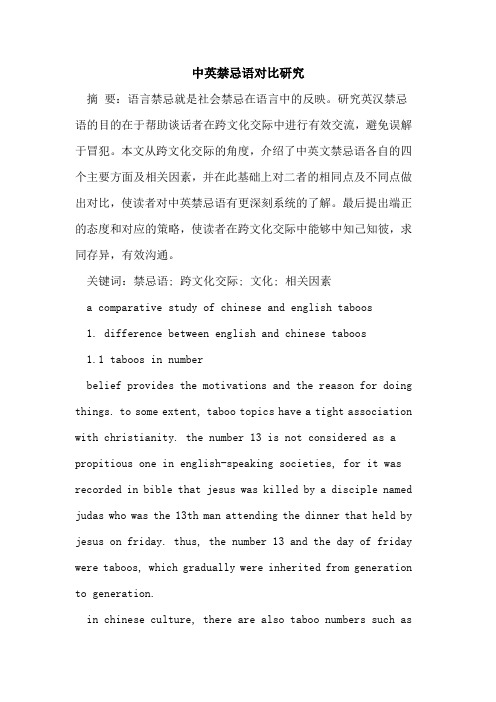
中英禁忌语对比研究摘要:语言禁忌就是社会禁忌在语言中的反映。
研究英汉禁忌语的目的在于帮助谈话者在跨文化交际中进行有效交流,避免误解于冒犯。
本文从跨文化交际的角度,介绍了中英文禁忌语各自的四个主要方面及相关因素,并在此基础上对二者的相同点及不同点做出对比,使读者对中英禁忌语有更深刻系统的了解。
最后提出端正的态度和对应的策略,使读者在跨文化交际中能够中知己知彼,求同存异,有效沟通。
关键词:禁忌语; 跨文化交际; 文化; 相关因素a comparative study of chinese and english taboos1. difference between english and chinese taboos1.1 taboos in numberbelief provides the motivations and the reason for doing things. to some extent, taboo topics have a tight association with christianity. the number 13 is not considered as a propitious one in english-speaking societies, for it was recorded in bible that jesus was killed by a disciple named judas who was the 13th man attending the dinner that held by jesus on friday. thus, the number 13 and the day of friday were taboos, which gradually were inherited from generation to generation.in chinese culture, there are also taboo numbers such as4, 73, 84. in chinese, the number 4(si) has a same pronunciation with the word death(si), accordingly, we usually think the number 4 is unlucky and should be avoided, which customs are reflected in the chinese language use. 1.2taboos in privacy regarding age, weight, income and so on.as is known to all, the westerners place a high value on privacy. they are self-centered and hold the views that their individual interests can’t be invaded at any time. the questions related to one’s age, weight, income, marriage will never be asked; otherwise they will entice more prejudice, and offence. yet, it is not the case in china. in fact, there is no equivalent term for “privacy”in chinese. the spirit of collectivism is treasured by chinese people from one generation to another. on the other hand, chinese people enjoy living together with their family members because it is a way to show harmony in the chinese view of thinking. it is not strange for us to find that even people from different families share a big courtyard in china. further, people in china don’t favor changing their homes frequently from one place to another. consequently, the chinese family members always live in one place through the whole life and they areought to be very family with people who share the courtyard with them. we have a saying to the effect that”远亲不如近邻”, which means when in trouble, the one who can help you is not the relatives who live far away from you, but your neighbors.2. similarities between english and chinese taboos2.1 religion and godin many western countries, a large number of people believe in christianity or catholicism, which is widely accepted and became the source and fertile soil of english taboos. as for english-speaking societies, people have a strong sense of religion and they think thoughts are controlled by religious belief and feudal ethical codes. further, owing to the productivity in the remote times was so low that some natural phenomena could not be explained, people at that time held that some religious words or expressions had a mysterious and supernatural power, so names of god and devil such as jesus, christ, joseph, heaven, hell have to be completely avoided on many occasions. yet, it is inevitable to mention the word “god”during the communication sometimes, so euphemism was created by the westerners to avoid directly mentioning the holy names. compared with religious verbal taboos inenglish-speaking countries, there are similar taboos about god in chinese as well. in the chinese view of thinking, god enjoys such an absolutely high power that no one or other things have a capability to exceed. if a person wants to cite god as his witness while making his vows, such phrases as “天”(sky)“上天作证”,”对天发誓”,or “上苍见证”will be chosen to express his feeling. besides, people have such expression in chinese as “妖魔鬼怪”,”钟馗捉鬼”and “鬼来了”.2.2 secretions and excretionsin western countries, words related to the behavior of excretions seem to be vulgar, they are always substituted by so-called elegant words in the conversation of sociality, since words about secretions and excretions are considered to be tabooed and should be absolutely banned from general use in public. both in english-speaking countries and in china, words concerning the behavior of urination and defecation are entirely abstained especially in eating; otherwise, they seem to be lousy. in terms of the chinese expression, there are a large number of words that used to substitute urination and defecation in chinese culture. the following phrases oftenoccur in our daily conversations or in novels. for example: “出去一下”, “方便一下”,”方便方便”,”去盥洗室”,”有点儿急事”,”解手”,”大号”,”小号”,”出恭”,”去唱歌”,etc.3. strategies of avoiding taboo3.1 unobtrusive observationin intercultural communication, uncertainly often occurs when we encounter people different from us. to communicate properly and effectively, we also need to know the information of the individuals we will encounter and the information of what and how we should say to them in a given situation. under such circumstances, we can take the role of unobtrusive observes, widely used in sociolinguistics and other scientific studies, to gather information about them, to induce how they will interact with us and to decide how we should interact with them by observing and comparing how they interact with people like us and people different from us.3.2 question-asking strategythere is a proverb in chinese “rujingwensu/入境问俗(on entering inquiry about its customs”. however, we should be careful when asking people questions if we don’t want to appear stupid or rude since what is considered acceptable maybe unacceptable in the eyes of our communication partners.3.3 euphemismeuphemism is an effective way of replacing unpleasant expression with pleasant ones. when confronting linguistic taboos in intercultural communication, one should either avoid them or try his best to use euphemisms so as not to offend others or threaten their face wants. in this way, we show respect for others and will be respected so that the communication may continue in the harmonious and pleasant atmosphere.bibliography[1]brown, p. &s. levinson. 1987. politeness: some university in language usage. cambridge: cambridge university press.[2]freud, sigmund. 1913. totem and taboo. london: macmillan.作者简介:孙晓华女咸宁职业技术学院中专部,籍贯:山西太原,1981年10月出生,学历:英语本科。
中英禁忌语对比研究及其在跨文化交际中的回避策略的开题报告

中英禁忌语对比研究及其在跨文化交际中的回避策
略的开题报告
中英文化有着不同的禁忌语和社交习惯,而在跨文化交际中,不了解这些差异可能会导致沟通不畅或造成尴尬局面。
因此,本文旨在探究中英文禁忌语对比,以及在跨文化交际中应采取的回避策略。
首先,中英文禁忌语对比研究是本文的重点。
在中文中,有许多被视为不吉利或带有负面意义的词汇,如“无妄之灾”、“四不像”等,而在英文中,则存在一些与宗教、性别、种族等相关的敏感词汇,如“blacklist”、“master”等。
此外,中英文在表达感受和态度上也存在一定差异,如中文中的“不好意思”、“没关系”等词汇的使用与英文中的“sorry”、“never mind”等表达方式有区别。
其次,针对跨文化交际中的回避策略,本文将探讨以下几方面。
首先,需要加强对不同文化禁忌的了解和尊重,尽量避免使用敏感词汇。
其次,需要关注自身的言行举止,注意不通过表情、语气等方式给人造成不了解或不尊重他人的印象。
最后,需要学会对文化差异的适当调整和妥善处理,在交流中避免刻板印象和偏见,以推动跨文化交流的顺利进行。
总之,本文将通过对中英文禁忌语对比研究及其在跨文化交际中的回避策略的探讨,为有志于跨文化交际领域的学者和从事跨国交流的人士提供参考和借鉴。
同时,本文亦将促进中英文化的相互了解和互动,为跨文化交流的和谐发展作出贡献。
汉英禁忌语对比研究

汉英禁忌语对比研究中文摘要禁忌语是一种非常普遍的语言现象。
每一个民族的语言都有自己的禁忌语,它存在于日常生活的各个方面,这些禁忌语在交流中起到举足轻重的作用。
语言是受思想控制的,禁忌语之间的差异反映了人们思想和思维的不同,人们思想的种种禁忌导致了禁忌语的出现,而文化是决定人们思想的最终因素。
东西方文化的不同决定了汉英禁忌语在很多方面存在差异,了解和把握这种差异,有助于消除跨文化交际障碍,实现跨文化交际的目的。
本文主要通过对汉英禁忌语内涵及特点、语用差异、表达手段、形成因素及在跨文化交际和对外汉语教学中的应用进行研究分析,旨在减少汉英语言交际过程中引起的不悦,避免语用失误,从而实现有效的跨文化交际。
关键词:禁忌语;跨文化交际;语用;汉英对比 - I - Abstract Taboowhich exists in almost every field of daily life is a kind of very commonphenomenon. Every language in the world possesses its own taboos that play animportant role in communication. Language is controlled by thought the differences ontaboo reflect the differences about thoughts of people.The thoughts of people make thetaboos exist.Howeverthe thoughts are determined by culture.It the the differencesbetween Chinese culture and Western culturethat makes the taboo different.To knowthe differences between Chinese taboo and English taboo can help us avoidmisunderstandings and make the cross-cultural communication successful. and Thepaper analyzes taboo by means of comparing the Chinese taboo with English taboo andpointing out the featuresthe ways of expressionpragmatic differences and the formativefactors of themaiming at reducing unhappiness in the course of communicationbetween English and Chinese culture avoiding pragmatic mistakes and making thecross-cultural communication effective.Keywords: taboocross-cultural communication pragmatic comparison between Chinese language and English language - II - 目录中文摘要 ................................................ ................................................... ........................IAbstract ......................................... ................................................... .............................. II绪论 ................................................ ................................................................................ 1第一章禁忌语的内涵及特点 ................................................ ........................................ 5 第一节禁忌语的内涵 ................................................ ............................................. 5 第二节禁忌语的特点 ................................................ ............................................. 6 一、普遍性的特点 ................................................ ............................................ 6 二、民族性的特点 ................................................ ............................................ 6 三、时代性的特点 ................................................ ............................................ 7 四、相对性的特点 ................................................ ............................................ 8 五、继承性的特点 ................................................ ............................................ 8 六、地域性的特点 ................................................ ............................................ 9 七、语境性的特点 ................................................ ............................................ 9 八、阶级性的特点 ................................................ ............................................ 9 九、含蓄性的特点 ................................................ .......................................... 10 本章小结 ................................................ ................................................... .............. 10第二章汉英禁忌语语用差异对比分析 ................................................ ....................... 11 第一节生、老、病、死的禁忌 ................................................ ............................11 第二节宗教、神圣事物的禁忌 ................................................ ........................... 13 第三节有关数字、颜色词的禁忌 ................................................ ....................... 13 第四节姓名称谓方面的禁忌 ................................................ ............................... 14 第五节有关猥亵性词语的禁忌 ................................................ ........................... 14 第六节有关体语方面的禁忌 ................................................ ............................... 16 第七节个人隐私与话题禁忌 ................................................ ............................... 16 第八节有关节日方面的禁忌 ................................................ ............................... 18 - III - 第九节种族、性别歧视禁忌 ............................................................................... 18 本章小节 ................................................ ................................................... .............. 19第三章汉英禁忌语禁忌手段对比分析 ................................................ ...................... 20 第一节修辞手段 ................................................ ...................................................20 一、委婉手段 ................................................ ..................................................20 二、暗喻手段 ................................................ ..................................................22 三、谐音手段 ................................................ ..................................................22 四、反语手段 ................................................ ..................................................22 五、讽刺手段 ..................................................................................................23 六、畸变手段 ................................................ ..................................................24 七、双关手段 ................................................ ..................................................24 第二节语法手段 ................................................ ...................................................24 一、否定句 ................................................ ................................................... ... 25 二、疑问句 ................................................ ................................................... ... 25 三、虚拟语气 ................................................ ..................................................25 第三节语用手段 ................................................ ...................................................26 一、话题手段 ................................................ ..................................................26 二、联想手段 ................................................ ..................................................27 本章小结 ................................................ ................................................... .............. 27第四章汉英禁忌语形成因素对比分析 ................................................ ...................... 29 第一节心理因素 ................................................ ...................................................29 第二节文化因素 ................................................ ...................................................31 第三节礼貌因素 ................................................ ...................................................32 第四节语言因素 ................................................32 第五节政治因素 ................................................ ...................................................33 本章小结 ................................................ ................................................... .............. 33第五章汉英禁忌语知识在跨文化交际及对外汉语教学中的应用 .......................... 34 - IV - 第一节从语用出发正确理解禁忌语现象 ................................................ ........... 34 第二节在跨文化交际中注意禁忌语现象 ................................................ ........... 36 第三节在对外汉语教学中如何正确地看待汉英禁忌语现象 ........................... 37 第四节对外汉语教学中禁忌语的教学策略 ................................................ ....... 38 本章小结 ................................................ ................................................... .............. 39结语 ........................................................................... 40参考文献 ................................................ ................................................... ..................... 41致谢 ................................................ ................................................... ........................... 43独创性声明 ................................................ ................................................... ................. 44 - V - 绪论一、课题研究的目的和意义语言是了解一个民族文化的窗口,文化作为一种意识形态是通过语言来表现其外在形式的,任何一种文化都需要通过语言形式来传承文化的不同影响了人们思维模式的不同,尤其是在跨文化交际中,它直接影响人们交际的效果。
跨文化交际中汉英禁忌语的对比研究
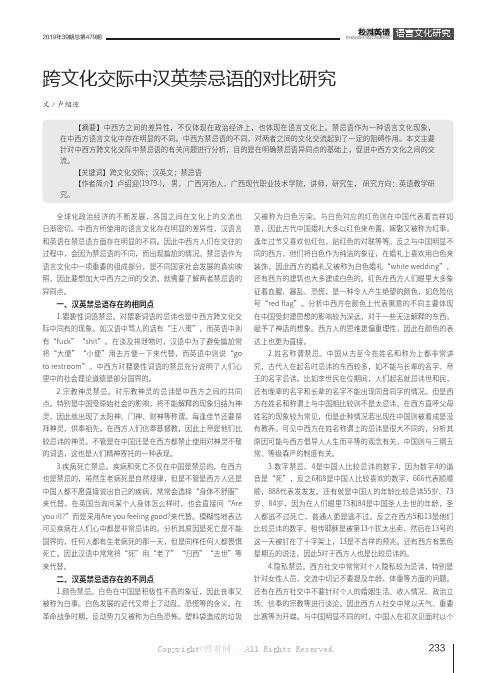
2019年39期总第479期ENGLISH ON CAMPUS跨文化交际中汉英禁忌语的对比研究 文/卢绍迎全球化政治经济的不断发展,各国之间在文化上的交流也日渐密切。
中西方所使用的语言文化存在明显的差异性,汉语言和英语在禁忌语方面存在明显的不同。
因此中西方人们在交往的过程中,会因为禁忌语的不同,而出现尴尬的情况。
禁忌语作为语言文化中一项重要的组成部分,是不同国家社会发展的真实映照,因此要想加大中西方之间的交流,就需要了解两者禁忌语的异同点。
一、汉英禁忌语存在的相同点1.猥亵性词语禁忌。
对猥亵词语的忌讳也是中西方跨文化交际中同有的现象。
如汉语中骂人的话有“王八蛋”,而英语中则有“fuck”“shit”。
在谈及排泄物时,汉语中为了避免尴尬常将“大便”“小便”用去方便一下来代替,而英语中则说“go to restroom”。
中西方对猥亵性词语的禁忌充分说明了人们心里中的社会理论道德是部分国界的。
2.宗教神灵禁忌。
对宗教神灵的忌讳是中西方之间的共同点。
特别是中国受原始社会的影响,将不能解释的现象归结为神灵,因此就出现了太阳神、门神、财神等称谓。
每逢佳节还要祭拜神灵,供奉祖先。
在西方人们信奉基督教,因此上帝是他们比较忌讳的神灵。
不管是在中国还是在西方都禁止使用对神灵不敬的词语,这也是人们精神寄托的一种表现。
3.疾病死亡禁忌。
疾病和死亡不仅在中国是禁忌的,在西方也是禁忌的,虽然生老病死是自然规律,但是不管是西方人还是中国人都不愿直接说出自己的疾病,常常会选择“身体不舒服”来代替。
在英国当询问某个人身体怎么样时,也会直接问“Are you ill?”而是采用Are you feeling good?来代替。
模糊性地表达可见疾病在人们心中都是非常忌讳的。
分析其原因是死亡是不能国界的,任何人都有生老病死的那一天,但是同样任何人都畏惧死亡。
因此汉语中常常将“死”用“老了”“归西”“去世”等来代替。
二、汉英禁忌语存在的不同点1.颜色禁忌。
中英禁忌语差异开题报告

中英禁忌语差异开题报告中英禁忌语差异开题报告引言:语言是人类交流的重要工具,不同的语言和文化中都存在着禁忌语。
禁忌语是指在特定的社会和文化背景下,被认为不适宜使用或会引起冲突、不悦或不尊重的词语或表达方式。
中英两种语言和文化之间存在着一些差异,本文将探讨中英禁忌语的差异以及背后的文化原因。
一、禁忌语的定义和作用禁忌语是一种被禁止或不宜使用的词语或表达方式。
禁忌语的存在是为了维护社会秩序、尊重他人和保护文化价值观。
禁忌语可以分为宗教、政治、社会、性别等多个方面。
在不同的文化中,禁忌语的范围和程度也会有所不同。
二、中英禁忌语的差异1. 宗教禁忌:中英两种文化中的主要宗教有所不同,导致禁忌语的内容也有差异。
例如,在中国,使用上帝的名字进行诅咒是被视为不敬的行为,而在英语中,使用God作为强调词并不会被认为是禁忌。
2. 社会禁忌:中英文化中对于社会地位、年龄和性别的敏感程度也存在差异。
在中国,提及某人的年龄较大或地位较低可能被视为不尊重,而在英语中,这种提及可能被视为正常的描述。
3. 性别禁忌:中英两种文化对于性别禁忌的敏感程度也存在差异。
在中国,直接提及女性的年龄或体重可能被视为不礼貌,而在英语中,这种提及可能被视为正常的交流。
三、文化背后的原因中英禁忌语的差异源于两种文化的不同价值观和传统观念。
在中国文化中,尊重长辈、维护社会和谐以及保护个人隐私是重要的价值观,因此一些与这些价值观相悖的言论被视为禁忌。
而在英语文化中,言论自由和个人表达的权利被重视,因此对于一些在中国文化中被视为禁忌的话题,英语文化中可能更加开放和接受。
四、跨文化交流中的挑战和应对策略在跨文化交流中,理解并尊重对方的禁忌语是非常重要的。
对于中英禁忌语的差异,我们可以采取以下策略来应对挑战:1. 学习对方的文化和价值观:通过学习对方的文化和价值观,我们可以更好地理解对方对禁忌语的敏感度和原因,从而避免冲突和误解。
2. 尊重对方的禁忌语:尽量避免使用对方文化中被视为禁忌的词语或表达方式,以免引起不悦或冲突。
跨文化交际下的汉英禁忌语异同探究

跨文化交际下的汉英禁忌语异同探究前言随着经济的发展,当今中外之间跨文化交际愈加频繁,进行交际的人都是在自己特定的文化背景下成长,在进行跨文化交际时很容易在无意间用本民族的社会规范、文化准则和社会语言来理解和判断他人的言行,因此很容易造成交际失误,造成这种失误的很敏感的因素便是汉英禁忌差异,其映射出的是中西文化差异。
在同一种文化中,由于地区或次文化的差异,禁忌有相同之处也有不同之处。
在不同的文化中,禁忌的共性就更少,而个性便愈鲜明。
禁忌无处不在,并反映在中、英语言中,禁忌中最明显的也是语言禁忌,因此,为了提升跨文化交际效果,促进中西文化交流,对汉英禁忌语进行研究是很有必要的。
一.禁忌语的概述(一).语言禁忌的定义所谓禁忌就是人们在日常生活中禁止做某些事或说某些话,或是忌讳别人做某些事或说某些话,禁忌是一道无形的戒律,约束着人们的言语和行为。
在英语中,禁忌被称为"Taboo";,即神圣的、被禁止的,语言禁忌则是禁忌中最为重要的一部分,被称为"verbaltaboo";;在中国,禁忌则是指忌讳,语言禁忌则是人们在语言交流中的忌讳。
《汉语委婉语研究》一书中,作者李军华提到"人们在交际中出于某种原因,不能、不敢或不愿意说出的某些词语,这些词语有的被认为危险、神圣、神奇,有的被认为令人难堪,还有的被认为不堪入耳,他们往往只限于某些人或某些场合下,这些现象被称为语言禁忌。
";【1】(P34)(二).禁忌语的分类标准不同,禁忌语的分类也大有不同。
以汉语为中心做分类可以分为人名称呼禁忌、岁数和属相禁忌、凶祸词语禁忌、财运衰败词语禁忌、污秽不洁词语禁忌、汉字禁忌;若以汉语与英语做对比为前提来分类,则可以分为人体器官和性行为禁忌、死亡病残禁忌、人体排泄的禁忌、字词发音禁忌、词汇禁忌、称谓禁忌以及话题禁忌,词汇禁忌中又可以分为色彩词汇禁忌、动植物词汇禁忌、数字词汇禁忌。
中西方交流中的禁忌语之对比研究
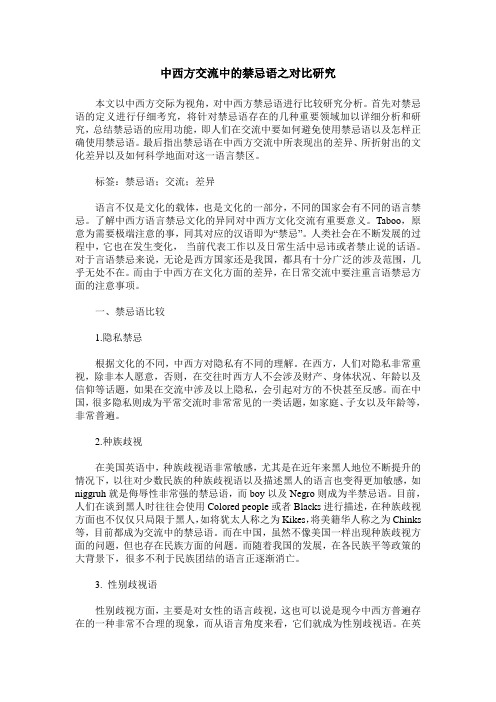
中西方交流中的禁忌语之对比研究本文以中西方交际为视角,对中西方禁忌语进行比较研究分析。
首先对禁忌语的定义进行仔细考究,将针对禁忌语存在的几种重要领域加以详细分析和研究,总结禁忌语的应用功能,即人们在交流中要如何避免使用禁忌语以及怎样正确使用禁忌语。
最后指出禁忌语在中西方交流中所表现出的差异、所折射出的文化差异以及如何科学地面对这一语言禁区。
标签:禁忌语;交流;差异语言不仅是文化的载体,也是文化的一部分,不同的国家会有不同的语言禁忌。
了解中西方语言禁忌文化的异同对中西方文化交流有重要意义。
Taboo,原意为需要极端注意的事,同其对应的汉语即为“禁忌”。
人类社会在不断发展的过程中,它也在发生变化,当前代表工作以及日常生活中忌讳或者禁止说的话语。
对于言语禁忌来说,无论是西方国家还是我国,都具有十分广泛的涉及范围,几乎无处不在。
而由于中西方在文化方面的差异,在日常交流中要注重言语禁忌方面的注意事项。
一、禁忌语比较1.隐私禁忌根据文化的不同,中西方对隐私有不同的理解。
在西方,人们对隐私非常重视,除非本人愿意,否则,在交往时西方人不会涉及财产、身体状况、年龄以及信仰等话题,如果在交流中涉及以上隐私,会引起对方的不快甚至反感。
而在中国,很多隐私则成为平常交流时非常常见的一类话题,如家庭、子女以及年龄等,非常普遍。
2.种族歧视在美国英语中,种族歧视语非常敏感,尤其是在近年来黑人地位不断提升的情况下,以往对少数民族的种族歧视语以及描述黑人的语言也变得更加敏感,如niggruh就是侮辱性非常强的禁忌语,而boy以及Negro则成为半禁忌语。
目前,人们在谈到黑人时往往会使用Colored people或者Blacks进行描述,在种族歧视方面也不仅仅只局限于黑人,如将犹太人称之为Kikes,将美籍华人称之为Chinks 等,目前都成为交流中的禁忌语。
而在中国,虽然不像美国一样出现种族歧视方面的问题,但也存在民族方面的问题。
中英禁忌语差异开题报告
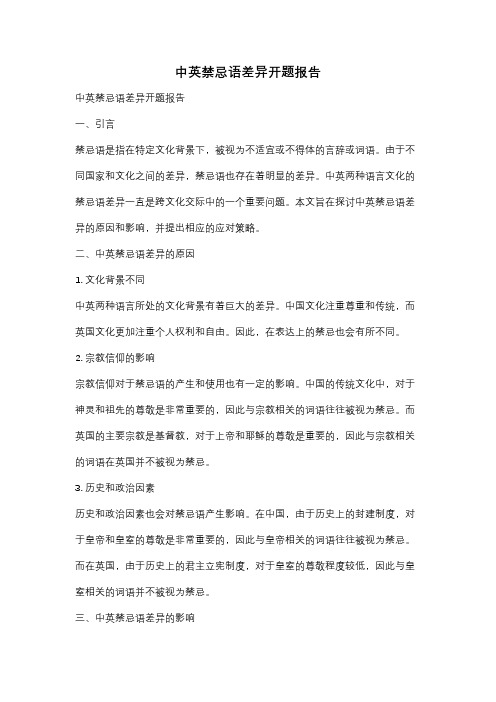
中英禁忌语差异开题报告中英禁忌语差异开题报告一、引言禁忌语是指在特定文化背景下,被视为不适宜或不得体的言辞或词语。
由于不同国家和文化之间的差异,禁忌语也存在着明显的差异。
中英两种语言文化的禁忌语差异一直是跨文化交际中的一个重要问题。
本文旨在探讨中英禁忌语差异的原因和影响,并提出相应的应对策略。
二、中英禁忌语差异的原因1. 文化背景不同中英两种语言所处的文化背景有着巨大的差异。
中国文化注重尊重和传统,而英国文化更加注重个人权利和自由。
因此,在表达上的禁忌也会有所不同。
2. 宗教信仰的影响宗教信仰对于禁忌语的产生和使用也有一定的影响。
中国的传统文化中,对于神灵和祖先的尊敬是非常重要的,因此与宗教相关的词语往往被视为禁忌。
而英国的主要宗教是基督教,对于上帝和耶稣的尊敬是重要的,因此与宗教相关的词语在英国并不被视为禁忌。
3. 历史和政治因素历史和政治因素也会对禁忌语产生影响。
在中国,由于历史上的封建制度,对于皇帝和皇室的尊敬是非常重要的,因此与皇帝相关的词语往往被视为禁忌。
而在英国,由于历史上的君主立宪制度,对于皇室的尊敬程度较低,因此与皇室相关的词语并不被视为禁忌。
三、中英禁忌语差异的影响1. 跨文化交际的困难中英禁忌语差异给跨文化交际带来了困难。
在交流中,若不了解对方国家的禁忌语,很容易触碰到对方的敏感点,导致误解甚至冲突的发生。
2. 影响社交和商务活动禁忌语的使用不当可能会影响社交和商务活动的进行。
在国际商务谈判中,若使用了对方国家的禁忌语,可能会导致谈判破裂或者对方的不满,从而影响合作关系。
3. 文化认同感的影响禁忌语的使用也与文化认同感密切相关。
若在跨文化交际中不了解对方国家的禁忌语,并且频繁触碰到对方的禁忌,可能会导致对方对自己的文化产生负面的认知和评价,从而影响文化认同感的建立。
四、应对策略1. 学习和了解对方国家的禁忌语在跨文化交际中,了解对方国家的禁忌语是非常重要的。
可以通过学习相关的文化知识、交流和咨询当地人等方式,积极了解对方国家的禁忌语,以避免因为不慎触碰到禁忌而导致的误解和冲突。
英汉禁忌语对比分析
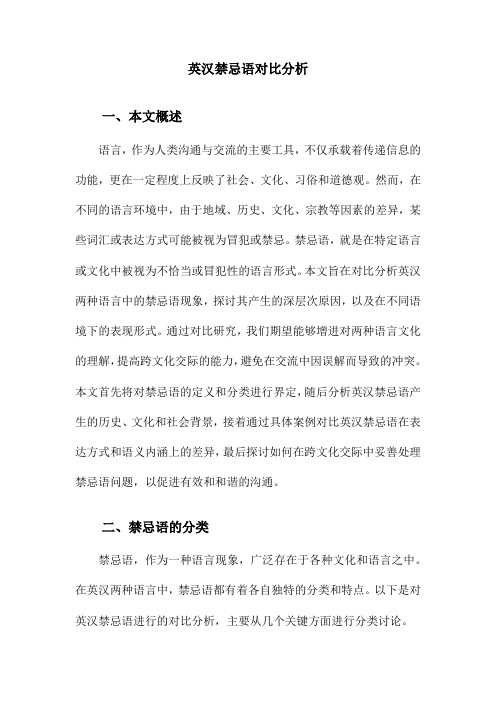
英汉禁忌语对比分析一、本文概述语言,作为人类沟通与交流的主要工具,不仅承载着传递信息的功能,更在一定程度上反映了社会、文化、习俗和道德观。
然而,在不同的语言环境中,由于地域、历史、文化、宗教等因素的差异,某些词汇或表达方式可能被视为冒犯或禁忌。
禁忌语,就是在特定语言或文化中被视为不恰当或冒犯性的语言形式。
本文旨在对比分析英汉两种语言中的禁忌语现象,探讨其产生的深层次原因,以及在不同语境下的表现形式。
通过对比研究,我们期望能够增进对两种语言文化的理解,提高跨文化交际的能力,避免在交流中因误解而导致的冲突。
本文首先将对禁忌语的定义和分类进行界定,随后分析英汉禁忌语产生的历史、文化和社会背景,接着通过具体案例对比英汉禁忌语在表达方式和语义内涵上的差异,最后探讨如何在跨文化交际中妥善处理禁忌语问题,以促进有效和和谐的沟通。
二、禁忌语的分类禁忌语,作为一种语言现象,广泛存在于各种文化和语言之中。
在英汉两种语言中,禁忌语都有着各自独特的分类和特点。
以下是对英汉禁忌语进行的对比分析,主要从几个关键方面进行分类讨论。
在英汉两种文化中,宗教都是重要的组成部分。
因此,与宗教相关的禁忌语也格外显著。
在汉语中,佛教和道教的宗教用语和象征都有严格的禁忌,如不得随意提及佛祖、道祖的名字,以及与之相关的神圣事物。
而在英语中,基督教的影响深远,涉及上帝、耶稣等神圣名词的言论都需要谨慎处理,以避免冒犯信仰者。
社会禁忌语主要涉及与社会习俗、道德规范等相关的内容。
在汉语中,对长辈、权威人物的称呼和言论有着严格的规范,如不得直接称呼长辈的名字,以及避免使用贬低或侮辱性的词汇。
而在英语中,虽然表达方式有所不同,但对性别、年龄、种族、社会地位等敏感话题的讨论也需要谨慎,避免引起不必要的冲突和误解。
习俗禁忌语是指与特定文化习俗相关的禁忌用语。
在汉语中,许多与死亡、疾病等相关的词汇都被视为禁忌,如“死”字常常用“去世”“走了”等委婉语代替。
在英语中,同样存在类似的习俗禁忌,如对于死亡的表述,人们更倾向于使用“pass away”“departed”等委婉说法。
中英禁忌语的比较研究.doc
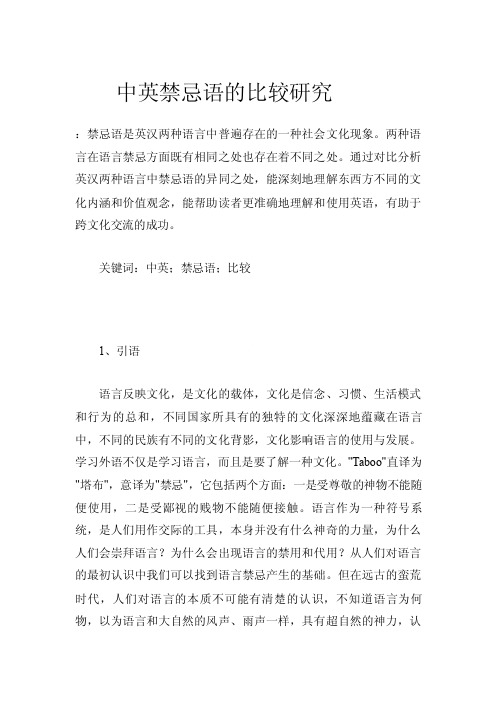
中英禁忌语的比较研究:禁忌语是英汉两种语言中普遍存在的一种社会文化现象。
两种语言在语言禁忌方面既有相同之处也存在着不同之处。
通过对比分析英汉两种语言中禁忌语的异同之处,能深刻地理解东西方不同的文化内涵和价值观念,能帮助读者更准确地理解和使用英语,有助于跨文化交流的成功。
关键词:中英;禁忌语;比较1、引语语言反映文化,是文化的载体,文化是信念、习惯、生活模式和行为的总和,不同国家所具有的独特的文化深深地蕴藏在语言中,不同的民族有不同的文化背影,文化影响语言的使用与发展。
学习外语不仅是学习语言,而且是要了解一种文化。
"Taboo"直译为"塔布",意译为"禁忌",它包括两个方面:一是受尊敬的神物不能随便使用,二是受鄙视的贱物不能随便接触。
语言作为一种符号系统,是人们用作交际的工具,本身并没有什么神奇的力量,为什么人们会崇拜语言?为什么会出现语言的禁用和代用?从人们对语言的最初认识中我们可以找到语言禁忌产生的基础。
但在远古的蛮荒时代,人们对语言的本质不可能有清楚的认识,不知道语言为何物,以为语言和大自然的风声、雨声一样,具有超自然的神力,认为语言中的音和意之间存在着"一种内在对应关系",那么语言和所指物之间就是一种等同的关系。
这样一来,语言就变成了具有某种超人力量的符号,假如行船之人说了"翻(帆)、陈(沉)"之类的字眼,那么就会不幸言中为了避免语言禁忌带来的危害,委婉语(euphemism)随之产生。
委婉语是指在正式场合或日常交流中,人们常用一些温和的、委婉的、吉利的、间接的词语来替代一些让人听起来感到粗俗的、不便直说的、忌讳的、不吉利或失礼的词语。
2、英汉相同禁忌话题英语和汉语中,在正式场合,除了在医生诊所之外,以下话题都属于禁忌:(1)人体的性器官;(2)性活动;(3)卫生间里的活动;(4)大便;(5)令人作呕之事,如呕吐、抠鼻子等;(6)令人难过之事,如患了癌症,死亡等。
英、汉禁忌语的对比研究与文化内涵

摘要:英、汉两种语言中存在着大量的禁忌语。
禁忌既是各民族所共有的一种社会现象,也是一种普遍的语言现象和文化现象。
文章从发展的观点勾勒出英汉禁忌语的演进,通过对英汉禁忌语的对比.指出二者的不同,并肯定二者的趋同现象,以便于了解语言的文化内涵,避免交际失误,达到理想的交际效果。
关键词:禁忌语;英汉对比:文化差异禁忌语作为语言的一个组成部分,与社会文化有着不可分割的联系。
一个社会的语言是该文化的一个方面,语言和文化是部分和整体的关系。
语言作为文化的组成部分,其特殊性表现在它是学习文化的工具。
本文主要讨论的是英、汉语言中的一种特殊现象一禁忌现象。
从英、汉禁忌语的对比,我们不难发现,英、汉禁忌语存在诸多的共同点,在表达方式上有许多不谋而合之处,但是英语和汉语毕竟隶属于不同的文化,语言禁忌语作为一定的社会文化现象,其背后所依托的是一个民族深厚的文化内涵,英、汉禁忌语总体相似的“外观”,实际上根植于相异的“内涵”,从其趋同的表象入手便可挖掘出英、汉民族在文化上的差异。
一、英汉禁忌语的起源及演进1.禁忌语的起源及定义。
语言禁忌是各民族共有的社会现象,可谓无处不在,无所不包。
禁忌一词的国际通用名称为“taboo”(直译为“塔布”,意译为“禁忌”)该词原是玻利尼西汤加语,意思是“需要极端注意的事”。
英国航海家James Cook(1728一l779)于1777年航行到南太平洋的汤加岛,发现当地存在着许多惊人的社会现象,如某些词语不能随便使用,否则会令人难堪,不快,甚至厌恶,当地居民把这种禁忌现象称为“taboo”。
“塔布”现象包含两个方面:一是受尊敬的神物不能随便使用,二是受郧视的贱物不能随便接触。
而所谓的语言塔布(verbal taboo)也包括两个方面即语言的灵物崇拜和语言的禁用或代用。
在中国,“禁忌”一词历史悠久,早在汉朝一些史料典籍中就有出现。
《汉书·艺文志》中记载:“及拘者为之,则牵于禁忌,泥于小数,舍人事而任鬼神”中国是一个以差序格局为文化取向的社会,历来讲究“君君,臣臣,父父,子子”。
汉英禁忌语对比研究
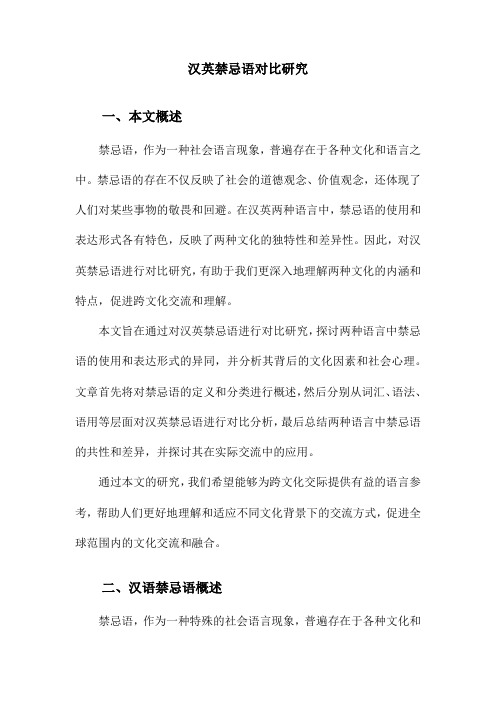
汉英禁忌语对比研究一、本文概述禁忌语,作为一种社会语言现象,普遍存在于各种文化和语言之中。
禁忌语的存在不仅反映了社会的道德观念、价值观念,还体现了人们对某些事物的敬畏和回避。
在汉英两种语言中,禁忌语的使用和表达形式各有特色,反映了两种文化的独特性和差异性。
因此,对汉英禁忌语进行对比研究,有助于我们更深入地理解两种文化的内涵和特点,促进跨文化交流和理解。
本文旨在通过对汉英禁忌语进行对比研究,探讨两种语言中禁忌语的使用和表达形式的异同,并分析其背后的文化因素和社会心理。
文章首先将对禁忌语的定义和分类进行概述,然后分别从词汇、语法、语用等层面对汉英禁忌语进行对比分析,最后总结两种语言中禁忌语的共性和差异,并探讨其在实际交流中的应用。
通过本文的研究,我们希望能够为跨文化交际提供有益的语言参考,帮助人们更好地理解和适应不同文化背景下的交流方式,促进全球范围内的文化交流和融合。
二、汉语禁忌语概述禁忌语,作为一种特殊的社会语言现象,普遍存在于各种文化和社会中。
在汉语中,禁忌语的使用尤为丰富和复杂,这既源于深厚的历史文化底蕴,也体现了人们对生活、社会、自然的敬畏和尊重。
汉语禁忌语主要分为两大类:一类是与死亡、疾病、灾难等负面事件相关的禁忌语,这类词语通常被视为不吉利,因此在日常生活中应避免使用。
例如,“死”“亡”“病”“丧”等词,在汉语中往往被视为禁忌,人们在交谈时会尽量避免使用这些词语,而是用委婉、含蓄的方式表达。
另一类禁忌语则与社会伦理、道德观念、宗教信仰等密切相关。
在儒家文化的影响下,尊老爱幼、尊重长辈、尊重权威等观念深入人心,因此在汉语中,与这些观念相悖的词语也成为了禁忌语。
例如,直接称呼长辈或权威的姓名被视为不敬,因此在正式场合中,人们通常会使用尊称或敬称来代替。
汉语禁忌语还体现在对特定事物或行为的禁忌上。
例如,数字“4”在汉语中与“死”谐音,因此被视为不吉利的数字,在一些场合中会被避免使用。
另外,对于某些动物或植物,由于与某些负面事件或观念相关联,也会成为禁忌语。
Chinese and English Linguistic Taboo
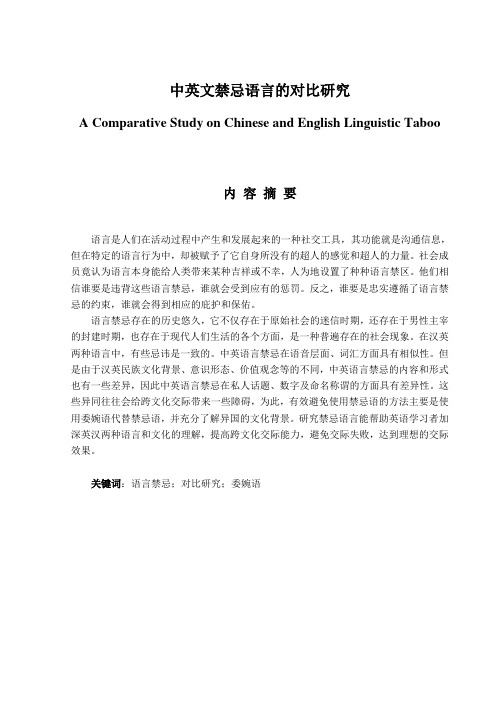
中英文禁忌语言的对比研究A Comparative Study on Chinese and English Linguistic Taboo内容摘要语言是人们在活动过程中产生和发展起来的一种社交工具,其功能就是沟通信息,但在特定的语言行为中,却被赋予了它自身所没有的超人的感觉和超人的力量。
社会成员竟认为语言本身能给人类带来某种吉祥或不幸,人为地设置了种种语言禁区。
他们相信谁要是违背这些语言禁忌,谁就会受到应有的惩罚。
反之,谁要是忠实遵循了语言禁忌的约束,谁就会得到相应的庇护和保佑。
语言禁忌存在的历史悠久,它不仅存在于原始社会的迷信时期,还存在于男性主宰的封建时期,也存在于现代人们生活的各个方面,是一种普遍存在的社会现象。
在汉英两种语言中,有些忌讳是一致的。
中英语言禁忌在语音层面、词汇方面具有相似性。
但是由于汉英民族文化背景、意识形态、价值观念等的不同,中英语言禁忌的内容和形式也有一些差异,因此中英语言禁忌在私人话题、数字及命名称谓的方面具有差异性。
这些异同往往会给跨文化交际带来一些障碍,为此,有效避免使用禁忌语的方法主要是使用委婉语代替禁忌语,并充分了解异国的文化背景。
研究禁忌语言能帮助英语学习者加深英汉两种语言和文化的理解,提高跨文化交际能力,避免交际失败,达到理想的交际效果。
关键词:语言禁忌;对比研究;委婉语AbstractLanguage, as the carrier of culture, is created during the process of human beings’ productive labor and serves as the tool of communication to convey the message between people. However, it has been endowed with magic and power in particular language acts. As the old saying goes, troubles come out of the tongue. Superstitious people think that the language itself can bring about fortune or misfortune, therefore the restriction of the use of taboo language are created. Anyone who violates them will get punishment, whereas those who faithfully obey the restrictions of taboo language will get protection.Taboo language has a long history. It existed in primitive superstitious times, feudal patriarchal times, but also exists almost every aspect of people's life in modern times. And it is a universal social phenomenon in China and Britain. Both Chinese and English cultures are in agreement about linguistic taboos such as pronunciation taboo, and vocabulary taboo. However, influenced by different cultural backgrounds, ideologies and the concepts of value, Chinese and English linguistic taboos also have differences in the aspects of taboo subjects, taboo numbers, names and literature. These similarities will often bring some obstacles to cross-cultural communication. There are two effective ways of avoiding taboo, that is, using euphemism and having a good knowledge of the taboo culture. It can help English learners improve their ability of cross-cultural communication and achieve better communicational effects.Key Words:linguistic taboo; comparative study; euphemismContentsIntroduction (4)1. The Existence of Linguistic Taboo (5)1.1 The Old Times (6)1.2 The Modern Times (8)2. The Similarities between Chinese and English Linguistic Taboo (9)2.1 Pronunciation (10)2.2 Vocabulary (11)2.2.1 Inelegance (12)2.2.2 Discrimination (14)2.2.3 Terms Concerning Disease, Death and Physical Disability (16)2.2.4 Terms Concerning Parts or Excretion of the Body (17)3. The Differences between Chinese and English Linguistic Taboo (18)3.1 Subjects (18)3.2 Numbers (19)3.3 Names (20)4. Ways of Avoiding Linguistic Taboo (21)4.1 Using Euphemisms (21)4.2 Having a Good Knowledge of the Taboo Culture (22)Conclusion (24)Notes (25)References (26)IntroductionTaboo language has a long history. Because many unconvients have brought by it and many people can’t stand up for it in daily life. So people study it generation by generation no matter in abroad or domestic. Long before people had studied which situation that language taboo existed, but it is far away to enough. It is manifested in language: persons, things and activities that are taboo should not be talked about or should be mentioned in a roundabout way in language. Words and expressions related to these social taboos are linguistic taboos. ” The above definition shows that linguistic taboo, as an integral part of language, is not only a linguistic phenomenon but also a social phenomenon.Like other parts of language, the origin of linguistic taboo is deeply rooted in the primitive social and cultural background and its change is greatly influenced by the development of human society in order to satisfy human beings' needs for smooth communications. With the advancement of science and technology, many puzzles about the universe are solved, and with the increase of material wealth, human demands for spiritual civilization are also becoming higher. Evidently, linguistic taboos are a reflection of these social development and the value concepts and beliefs of the culture in which they are born. It exists in every aspect of people's life.4There are some similarities in English and Chinese linguistic taboo, but different cultures may not all agree on what is or is not a taboo in a specific context. So the differences also exist between English and Chinese linguistic taboo. A Lack of knowledge in this field or improper use of linguistic taboos may lead to misunderstandings, conflicts and other unknown serious consequences in the cross –culture communications which is increasingly frequent and wider now.This paper intends to study the evolution of linguistic taboo, to analyze the similarities between Chinese and English linguistic taboo in pronunciation and vocabulary, and present the differences from the aspects of names, numbers as well as taboo subjects in both cultures. Last but not least, two effective ways are proposed to avoid linguistic taboos.1. The Existence of Linguistic TabooThe word taboo (also spelled as “tabu”, “tapu” and “kapu”) was borrowed from Tonga, an island group in Polynesia, and its first recorded use in English was by Captain James Cook (1729-1779), a British navigator. He came to the Archipelago of Tonga during his explorations in the southern part of the Pacific Ocean. There he heard the word from the local people, which originally referred to persons, activities (including speech), or things under prohibition because5they were considered, on the one hand, ”sacred” and “consecrated”, and on the oth er, “uncanny”, “dangerous” and “unclean”. He introduced it into English in his description of his third voyage around the world in 1777. But taboo phenomena are not unique in Tonga. Instead, it has long existed in all cultures and language throughout the world.As we have mentioned above, linguistic taboo is not only a linguistic phenomenon but also a kind of social phenomenon. The development of society has influenced the development of linguistic taboo. So if we want to reveal the whole picture of linguistic taboo, we must have a review of the history of linguistic taboo. The existence of linguistic taboo has generally experienced two times according to the history of human society: the old times and the modern times1.1 The Old TimesAs we all know, In the ancient times, people didn't get to know well about nature, most natural phenomena such as lightning, thunder, storm, earthquake, were beyond the understanding of human beings. When these phenomena happened, they thought that certain supernatural creatures possessed great power. They thought that if they were loyal to these supernatural creatures, they would be safe or rewarded. If they acted against them, they would be punished severely.6As a result, the primitive people created different kinds of gods. They held a strong religious conviction that these gods controlled the world that they were living in. So the first thing they did was to respect these gods through language. In a word, the earliest linguistic taboo emerged as a result of the ignorance and superstition of the primitive people in ancient times.Feudal society is rigidly stratified. A country of feudalism is usually controlled by the royals and sometimes together with those considered with great power given by god. During the feudal times, people were not equal to the rulers and were suppressed by their superiors. The distinction between the upper and the lower classes was also reflected in the evaluation of the language used by them respectively. The words of upper class used were considered good and elegant while those used by the lower class were regarded as vulgar and indecent and should be avoided in the speech of ladies and gentlemen. For example, when referring to “出汗” , duchesses used the word “perspire”, but the female servants used “sweat”during the feudal times, men usually play a dominant role in family. We can see it from the Chinese expressions “三从四德” ,“三纲五常”etc. In order to strengthen their position and to prevent their subjects from violating them, the royals and kings put forward different kinds of prohibitions and bans. For instance, to show their authority and majesty, the name of the emperor and his ancestors should not be mentioned. Most linguistic taboos during this period were put into effect by rulers in order to maintain their7superior social position and keep the society under their control. However, some of them, because of their deep-rooted influence on people's mind, still remain in language even after the collapse of the social system.1.2 The Modern TimesIn modern society, as a result of the development of science and technology, many natural phenomena are no longer mysterious. Human beings not only constantly improve their abilities to exploit the world where they are living through their great wisdom and knowledge, but also make efforts to explore the extraterrestrial world. Science has much more say in today's society. Thereby, the superstitious elements in linguistic taboos decrease while those reflecting spiritual civilization increase.During such an open-minded period, people value freedom, equality and democracy very much. Many minorities struggle for equal rights with the majorities. As a result, linguistic taboos concerning racial discrimination arise. For example, in the United States, “nigger” was widely used to call black people in the 1960s but now it is forbidden in normal interaction because such form of addressing shows contempt for the black and goes against the spirit of human rights.8In addition, more and more women step outside their houses to work together with men. They don't want to depend on men any longer. However, the traditional ideas about women stifle the fulfillment of their abilities and they are often treated unfairly in work. This forces women to rise and fight for equalities with men and more and more men begin to learn to respect women, which will have an influential effect on the language. As a result, taboos on sexist language increase. Besides, in an era of peace, the relative stability of society and the fast pace of life, people don't bother much to avoid things in the objective world. Instead, they prefer living a pleasant and harmonious life. They enjoy spiritual entertainment very much, so they try to avoid those words and behaviors that may make others feel unpleasant to keep the harmonious relationship. Those professions that were looked down upon in the past are beautified now. The substitution of “sanitation engineer” for “garbage collector” is a good example for this. As a whole, since the third stage, people today show more respect for science and technology and human rights so that the superstitious and feudal elements in linguistic taboos tend to reduce while those reflecting the advancement of human society and spiritual civilization tend to increase.2. The Similarities between Chinese and English Linguistic Taboo9There are taboos for religion, sex, death, disease, social bias, etc. in both Chinese and English cultures and they are reflected in their respective language and become a kind of linguistic phenomenon. The similarities of Chinese and English linguistic taboo mainly embody in the following aspects:2.1 PronunciationBoth Chinese people and English people believe that saying words that imply misfortunes or disasters may bring them trouble, and they thought misfortunes can be prevented by replacing the words with homophones that have better meanings.In China, many taboos have been caused by superstitions. In Shanxi province of China, there is a custom that mulberries can not be planted in front of the house and willows can not be planted behind the house, because the Chinese character “桑(mulberry)”sounds the same as “丧(mourning)and “柳(willow)”sounds the same as “绺”. They may indicate that there will be a funeral and something will be stolen. Chinese people will not present a clock as a gift in weddings or other ceremonies, because “ clock” pronounces “zhong (钟)”, which has the same pronunciation as “zhong/终(end)”, meaning death in Chinese. [1]10Many other examples also can be found in Chinese. Some fisherman in South China avoid saying such word as “fan/翻(turn over)” or “chen/沉(sink)” and any other words with similar sounds. Some even change their surname “chen/陈” which sounds the same as “chen/沉”. It is said that the chopsticks people in the East use when having meals were originally called “zhu/箸” in ancient China. Since it had the same sound as “zhu/住(stop)”, it was replaced later by “kuaizi /筷子” since “kuai/筷” sounds like “kuai/快(quick)”.In western countries, there are also many such kinds of examples. When a word sounds the same as a taboo word, it needs changing into another expression. For instance, in earlier 18th century, the female in English and American countries always tried to avoid using the word ‘arse(the bottom part of the body one sits on)', which was considered inelegant. So people called the a nimal “ass” as “donkey”. Another typical example is that “fuck(a sail)”, “feck” or “fack(fact)” are seldom used or even go out of use, because they pronounce the same as “fuck”. Neaman made a co nclusion that the reason why some words disappeared were related to the fact that their pronunciation are the same as some taboo words.2.2 VocabularyWe use vocabulary everyday, and we also try our best to avoid use taboo words. “Roughly speaking, tabo o words in English fall into three types, namely obscenities, profanities and vulgarities”. These kinds of vocabulary are analyzed into three types, that is analyzed into inelegance vocabulary, discrimination vocabulary and others.2.2.1 IneleganceInelegance words refer to words may cause offence to the social moral principles. It includes obscene words profanity words and vulgarity words. In both English and Chinese, these words are to be avoided in polite conversations, because they may cause strong disapproval.Obscene words are related to human beings sexual behaviors. In America, the Sexual Revolution in 1960s and 70s made people more open toward sex, but now words such as “making love” and “having sex” still seldom appear directly in writing, let alone in conversation. Western people are serious towards sex terms to a certain degree, so to speak.The Chinese people also treat terms on sex seriously. Chinese people always use the expression of “ 作风问题”or“不正当关系”to show the immoral relationship between a man and a woman.Profanities refer to religious words used in a way that shows a lack of respect for God or holy things. Religion is a fertile field of this type of taboo terms. A typical example is that Christian cannot refer to God or God's name. “The Ten Commandments forbid people to ‘take the name of the Lord your God in vain'. So it is considered very rude to say ‘goddame' or ‘goddamned'”. The words such as “God,” “Jesus,” “damn” and “hell” etc, are considered holly and only properly used in religion. If they appear in daily communication, they will make people unpleasant and disgusted. So people always try to avoid using these taboo words directly. Some people also avoid referring to the devil, which is considered disrespectful. So they use “the deuce”, “the dickens”, “ old Nick” to substitute “ the devil”. We can find similar examples in Chinese. In religion, people use some complimentary address to refer to awesome gods, e.g. “大帝”, “大圣”, “佛陀(Buddha)”. [2]Both in English and Chinese the vulgar words are usually rude and offensive and bring about unpleasantness, anger or conflicts. Swearwords in English are often called four-letter words, because most of them are short, and many are made up of four letters, e.g.: piss, shit, crap, fuck. These so-called four letter words are considered vulgar. Swearwords formed by employing some of the animals' names are vulgarities too.In Chinese, there are also many similar sayings, such as “小兔崽子”, “羊巴羔子”, “狗娘养的”, “小王八” etc. These words are used to insult others. Peoplealways try to avoid using them in a normal and polite communication. The existence of taboo language indicates that taboos involve in almost every field of life.2.2.2 Discrimination“In recent years, there is a growing tendency to regard as taboo language that reflects a demeaning attitude towards certain social or ethnic groups. Racist language and sexist language, for example, are offensive to the social or ethnic groups th at are discriminated against.” [3]Discrimination against woman is a universal and unreasonable phenomenon in the society. And its reflection on language is sexist language. Both in English and Chinese, there are traces of sexist language. Unless one is careful enough with his/her speech, one may easily offend others unconsciously. In China, under the control of strict hierarchy feudal society, the females were regarded inferior. They depend on male and were dominated by male. So the discrimination and prejudice against women is the long-term accumulation, which is inevitably reflected in Chinese. For example, the sayings “妇人之见”, “头发长见识短”, “男子汉不和妇人一般见识”, “长舌妇”, etc, reflect the pejorative attitude toward women. Since the Chinese women’s social statuses have increased, these sayings are used much less frequently. The using of thescornful and pejorative words for women in public often gets criticism and resentment.In English, there are also many sexist expressions. For example, a person of unknown sex is referred as “he”, or “him” rather than “she” or “her”. A person who presides a meeting is the “chairman”, even if she is a woman. “Nowadays, perhaps as a result of the Woman's Liberation Movement in the 1960s and 70s in western countries, especially the U.S.A and socio-culture development, most native English speakers try to avoid sounding like a sexist.” [4] When referring to human beings, people begin to use “humankind” or “ the human race” instead of “man” or “mankind”.“Racism is the belief that certain human races are inherently inferior to others and racist language is that which shows a biased attitude towards certain r acial or ethic groups.”[5]In English, no matter intentionally or not, the following words are against black people and annoying them unsatisfied. For example, “white” means “pure”, “clean”, “benevolent”, which have positive meaning. While “black” is related to “evil”, “wrongdoing”, and “dirty” such as “blackguard”, “blacklist”, “blackmark” etc. Besides, “nigger” and “boy”, for a black adult man, often have offensive meaning.In Chinese, there is also racist language. For example, using “蒙古大夫” for an inco mpetent doctors; using “小鬼子” for Japanese. “洋鬼子”,“大鼻子”for westerners. [6] Most of these words are derogatory. It shows off that Chinese is more superior than other racial or ethic groups.2.2.3 Terms Concerning Disease, Death and Physical DisabilityEither in English or in Chinese culture, disease, death, and physical disability may horrify people. So people don't like to mention these directly in conversations. Therefore, they are considered taboos.In both English and Chinese, death is viewed as “departing”. In English, we can find many euphemisms for death, such as “go”, “depart from this world”, “go to a better world”, “go the ways of all flesh”, “pass away” etc. In Chinese, we also can find similar euphemisms: “去了”, “离开了我们”, “辞世”, “去见马克思了”, “归西”,“升天” etc. In both English and Chinese, death is compared to “sleeping”, “sleep” in English correspond to “正寝”,“长眠”,or “永眠” in Chinese. [7]Words denoting terrible disease are also sources of horror. In English, people don't like to talk about terrible disease or disease related to sexual organs directly. For instance, they use “V.D.” instead of “veneral disease”; use “big C”, “long disease”, or “terminal illness”to replace “cancer”. Abbreviations are often used to alleviate the shocking effect. For instance, SARS is used to substitute the terrible name “Severe Acute Respiratory Syndromes”.In Chinese, when we talk to a patient, we may say “你今天不舒服,别上班了”.Here, we use “不舒服” instead of “病”. As a soldier, we may say “挂彩了” instead of “伤”. Mental illnesses are thought not to be mentioned directly. For example, when referring to a mental illness, we just say “a little eccentric” or “a little confus ed”.Either in Chinese or Western, people have sympathy for one's physical disability. If someone looks ugly, we will say she/he looks plain/ordinary and we won't use the word “fat” to describe a man. We only use “heavily set” or “on the heavy side”. If a girl is thin, we won't use skinny. We just say slender, and when we refer to a crippled, we will say, “physically handicapped”. In Chinese, if one is deaf, we will say “耳朵背”. In English, it is called “hard of hearing”.2.2.4 Terms Concerning Parts or Excretion of the BodyIn both cultures, people think that certain parts of the body and the excretion of body cannot be mentioned in daily conversations. They are often considered taboos.For example, in English, there are so many euphemisms for lavatory, such as “washroom”, “restroom”, “and bathroom”, “comfort station”. If they want to go to lavatory, they will say: “go to the bathroom”, “do their business”, “answernature's call”. In Chinese, “厕所” is always avoided in public occasion, one may say :“去一号” or“去方便一下”.3. The Differences between Chinese and English Linguistic TabooAlthough there are many similarities in English and Chinese, different views about what is or isn’t taboo can be foun d in two cultures. Differences between Chinese and English linguistic taboo embody the following aspects:3.1 SubjectsEnglish people place a high value on privacy. “The English have a saying ‘ A man's home is his castle, meaning a man's home is sacred t o him; no one should come in without permission. So it is also with his life and personal affairs'”. [8]Chinese people often like to greet to others like “Have you had a meal?” This common greeting indicates we begin our conversation with our acquaintance, just as foreigners ask “How nice the weather!” But the Chinese greeting will make the foreigners suspect that you want to invite him to join the dinner. Sometimes when we get together and talk naturally about these questions: “ How about your salary?” “Are you married?”, “What do your wife/husband do?”, “How much is your skirt?” In this way, we express our care for our friends.Generally speaking, we never feel embarrassed about these conversations, but when we ask the westerners the same questions, they will think we may involve in their privacy.3.2 NumbersIn China, the number “4” and the word “死(death)” almost sound the same. People do not like the number “4”, because it reminds them of “death”. Among old people, they think “73” and “84” are two key ages. If you are 73 or 84 years old, you will die before the King of hell invites you. So many old people avoid talking their exact ages.While in western countries, one of the most influential taboo numbers is 13. According to the story of “The last supper”: Judas, the person who betrayed Jesus, sat in the No.13 chair, therefore, Number thirteen is universally considered to be unlucky. No door's number is thirteen; no hotel has the No.13 Room; they don't allow 13 people have dinner together. All in a word, they avoid number thirteen in every aspect. Another number concerning taboo in western is Friday. It also has long been considered as an unlucky day. “This taboo term affects people probably not only because they believe that Jesus Christ was put to death on the cross on Friday, but also because Friday is formany years the day of execution of criminals, commonly called “hangman's day”. [9]Another striking contrast is that Chinese people like even numbers. Chinese people especially like the even number “6” and “8”. The saying “六六大顺” can prove it . But in western countries, they like odd numbers. “The Roman poet Virgil says, ‘The god delights in an odd number’. In Shakespeare’s play Merry wives of Windsor, Falstaff says, ‘Good luck lies in odd numbers—' They say, “there is divinity in odd numbers, either in nativity, chance or death.'” [10]3.3 NamesHow to call others in verbal communication is very important. In Chinese, the ancestors' and the older generation's names cannot be referred directly. For example, because the second name of Sima Qian's father was “谈”. So we cannot find such a Chinese character “谈” in the Historical Records. [11] But in the English culture, there are no such name taboos. The younger generation can refer the elder generation’s name directly. It shows that they are equal, friendly and intimate. English babies may be named after their grandparents or other relatives to show respect or to honor them. This practice was quite different from Chinese culture which was characterized by a clearly delineated stratified society in which the names, for example, of one's relatives, one or twogenerations above, or officials, or other influential figures were taboos to the ordinary Chinese, no one dared to name his babies after them.4. Ways of Avoiding Linguistic TabooIn order to have good behavior before people, we try to avoid linguistic taboo. It's good for us to build good relationships between people. Because taboo language brings so many obstacle in our daily life, it's necessary to take action to avoid linguistic taboo in our daily life. There are two ways of avoiding linguistic taboo as follows:4.1 Using euphemismsFrom the above discussion, we know that some harsh, blunt, unpleasant offensive and taboo things or acts should not be expressed directly in our daily life. So it is very important for us to know how to avoid these linguistic taboos.Most linguistic taboos can be avoided by the employment of euphemisms. Euphemism refers to the use of pleasant, vague or indirect words or phrases to take the place of more accurate direct or taboo ones. In other words, euphemism is a means of expressing the words or things that are prohibited.Euphemisms are used almost in all fields of life. For example, when a judge gives the criminal a sentence, he will directly say: “I hereby sentence you to f ive years in prison.” But the criminal himself or his relatives will tell others: “Somebody is sent to the big house.” for the purpose of saving face. At the same time, we must realize that language is alive and changing all the time. Influenced by the social psychology and its culture, euphemisms change constantly. A euphemism may quickly acquire the stigma of the word it replaced and becomes a taboo after people use it for a time. For example, there is a series of expressions about the word “poor”. “At fi rst I was poor, then, I became needy, later I was underprivileged. Now I'm disadvantaged. I still don't have a cent to my name, but I sure have a great vocabulary.” [12] Another example is that, in American English, euphemisms for the word “buttocks” are “ass”, “can”, “tail”, “cheeks”, “caboose”, “fundament” and now the newest one is “sitting-down place”.4.2 Having a Good Knowledge of the Taboo CultureLanguage and culture rely on each other and influence each other. Languages are formed and develop under certain cultural background. Linguistic taboo is a kind of social phenomenon. Its existence and development are restricted and influenced by specific cultural background. Some words areprohibited in English; some words are banned in Chinese and some words are prohibited in both languages. As a result, if one wants to avoid violating taboos, he or she should have a good knowledge of what is or is not a taboo in this culture. For example, in China, the word “old” means “experience” and “wisdom”. At the sam e time, Chinese people are influenced by the long-term concept of respecting the old and taking care of the young. Chinese people seem to like to address each other as “老(old)” ,for example, “老爷爷”, “老奶奶”, “老林”, “老吴”, “老教授”. But English people always connec t the "old" with "uselessness" and "death". Therefore, when contacting with English people, the saying of “somebody is old” should be avoided in order not to arouse unpleasantness. For Example, we cannot call somebody “old Smith” or “old Brown”. Especially for women who are sensitive to age, no matter how old they are, we should not call them “奶奶” or “大娘” ,though they are pleasant greetings in China. In English, expressions such as “senior citizens”, “advanced in age”, “golden years” etc. are produced in order to avoid “old”. A smooth cross-cultural communication greatly benefits from the good command of a foreign language's cultural background knowledge. It is hard to imagine a Chinese who has a poor knowledge of English taboo culture can intercommunicate with the English people smoothly and without offending them, and vice versa.。
英汉禁忌语对比分析
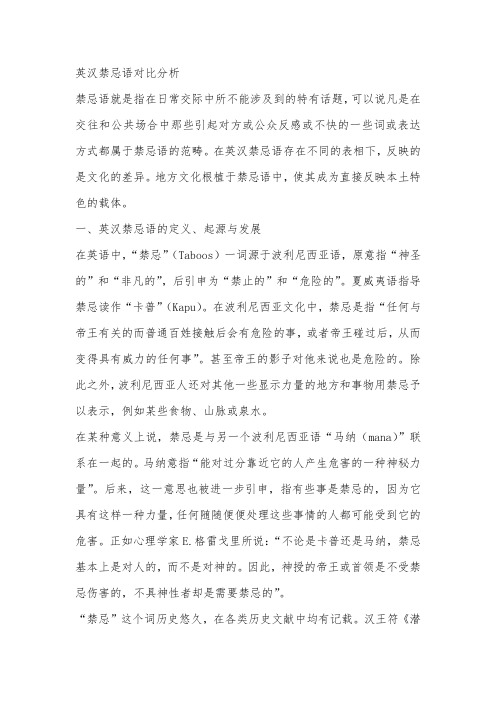
英汉禁忌语对比分析禁忌语就是指在日常交际中所不能涉及到的特有话题,可以说凡是在交往和公共场合中那些引起对方或公众反感或不快的一些词或表达方式都属于禁忌语的范畴。
在英汉禁忌语存在不同的表相下,反映的是文化的差异。
地方文化根植于禁忌语中,使其成为直接反映本土特色的载体。
一、英汉禁忌语的定义、起源与发展在英语中,“禁忌”(Taboos)一词源于波利尼西亚语,原意指“神圣的”和“非凡的”,后引申为“禁止的”和“危险的”。
夏威夷语指导禁忌读作“卡普”(Kapu)。
在波利尼西亚文化中,禁忌是指“任何与帝王有关的而普通百姓接触后会有危险的事,或者帝王碰过后,从而变得具有威力的任何事”。
甚至帝王的影子对他来说也是危险的。
除此之外,波利尼西亚人还对其他一些显示力量的地方和事物用禁忌予以表示,例如某些食物、山脉或泉水。
在某种意义上说,禁忌是与另一个波利尼西亚语“马纳(mana)”联系在一起的。
马纳意指“能对过分靠近它的人产生危害的一种神秘力量”。
后来,这一意思也被进一步引申,指有些事是禁忌的,因为它具有这样一种力量,任何随随便便处理这些事情的人都可能受到它的危害。
正如心理学家E.格雷戈里所说:“不论是卡普还是马纳,禁忌基本上是对人的,而不是对神的。
因此,神授的帝王或首领是不受禁忌伤害的,不具神性者却是需要禁忌的”。
“禁忌”这个词历史悠久,在各类历史文献中均有记载。
汉王符《潜夫论•忠贵》:“贵戚惧家之不吉而聚诸令名,惧门之不坚而为铁枢,卒其所以败者,非苦禁忌少而门枢朽也,常苦崇财货而行骄僭,虐百姓而失民心尔。
”汉应劭《风俗通•正失•彭城相袁元服》:“今俗间多有禁忌,生三子者、五月生者,以为妨害父母,服中子犯礼伤孝,莫肯收举。
”《后汉书•郎传》:“臣生长草野,不晓禁忌,披露肝胆,书不择言。
”唐苏拯《明禁忌》诗:“阴阳家有书,卜筑多禁忌。
”在西方历史上,黑人是最受歧视的种族,因此很多带有浓厚歧视色彩的词汇出现了。
随着社会的发展,人权与民族平等思想的深入人心,这些种族歧视语成了英语禁忌语的重要组成部分。
汉英禁忌语的语用对比 英语专业毕业论文
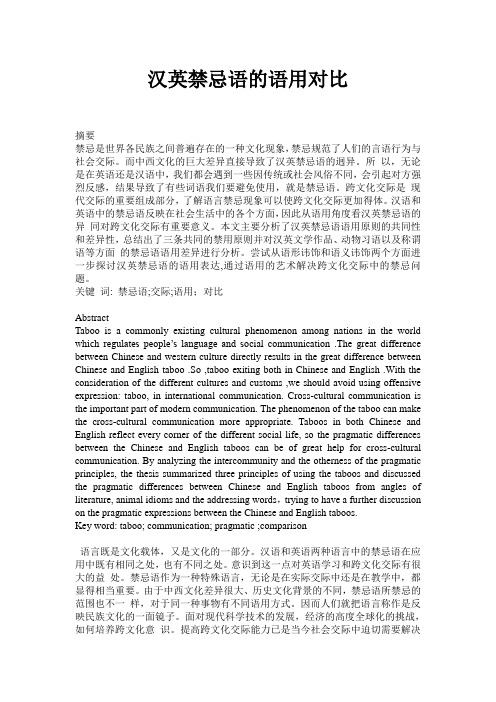
汉英禁忌语的语用对比摘要禁忌是世界各民族之间普遍存在的一种文化现象,禁忌规范了人们的言语行为与社会交际。
而中西文化的巨大差异直接导致了汉英禁忌语的迥异。
所以,无论是在英语还是汉语中,我们都会遇到一些因传统或社会风俗不同,会引起对方强烈反感,结果导致了有些词语我们要避免使用,就是禁忌语。
跨文化交际是现代交际的重要组成部分,了解语言禁忌现象可以使跨文化交际更加得体。
汉语和英语中的禁忌语反映在社会生活中的各个方面,因此从语用角度看汉英禁忌语的异同对跨文化交际有重要意义。
本文主要分析了汉英禁忌语语用原则的共同性和差异性,总结出了三条共同的禁用原则并对汉英文学作品、动物习语以及称谓语等方面的禁忌语语用差异进行分析。
尝试从语形讳饰和语义讳饰两个方面进一步探讨汉英禁忌语的语用表达,通过语用的艺术解决跨文化交际中的禁忌问题。
关键词: 禁忌语;交际;语用;对比AbstractTaboo is a commonly existing cultural phenomenon among nations in the world which regulates people’s language and s ocial communication .The great difference between Chinese and western culture directly results in the great difference between Chinese and English taboo .So ,taboo exiting both in Chinese and English .With the consideration of the different cultures and customs ,we should avoid using offensive expression: taboo, in international communication. Cross-cultural communication is the important part of modern communication. The phenomenon of the taboo can make the cross-cultural communication more appropriate. Taboos in both Chinese and English reflect every corner of the different social life, so the pragmatic differences between the Chinese and English taboos can be of great help for cross-cultural communication. By analyzing the intercommunity and the otherness of the pragmatic principles, the thesis summarized three principles of using the taboos and discussed the pragmatic differences between Chinese and English taboos from angles of literature, animal idioms and the addressing words,trying to have a further discussion on the pragmatic expressions between the Chinese and English taboos.Key word: taboo; communication; pragmatic ;comparison语言既是文化载体,又是文化的一部分。
- 1、下载文档前请自行甄别文档内容的完整性,平台不提供额外的编辑、内容补充、找答案等附加服务。
- 2、"仅部分预览"的文档,不可在线预览部分如存在完整性等问题,可反馈申请退款(可完整预览的文档不适用该条件!)。
- 3、如文档侵犯您的权益,请联系客服反馈,我们会尽快为您处理(人工客服工作时间:9:00-18:30)。
最新英语专业全英原创毕业论文,都是近期写作1 交际法在大学英语教学中的现状探究2 跨文化交际下的中英文禁忌语的对比研究3 浅析公示语的翻译4 论考琳•麦卡洛《荆棘鸟》中的女性形象5 美国俚语中所折射出的美国亚文化现象6 中英日委婉语语言特征7 现实主义和唯美主义的水乳交融—评茨威格《一个陌生女人的来信》8 论跨文化商务中的非言语交际9 毕业论文]Tragedy in The Mayor of Casterbridge10 教师的态度对初中学生英语学习的影响11 从符号学理论角度探讨网络命名的文化倾向12 美国校园俚语发展的促动因素看美国的自由精神13 浅析《了不起的盖茨比》中的主要人物性格14 On the Female Initiation Theme in Little Women15 文档所公布均英语专业全英原创毕业论文。
原创Q 799 75 79 3816 电影字幕英汉翻译中网络流行语的现象研究17 论《教授的房子》中圣彼得教授对自我的追求18 职场女性的言语行为的礼貌原则19 从美国核心价值观分析美国家庭学校产生的必然性20 英语习语学习策略的探究21 试析文化语境对大学英语阅读的影响22 游戏教学在小学英语课堂中的运用23 论《弗兰肯斯坦》中怪物悲剧的必然性24 浅谈中国电影字幕英译中的归化与异化25 论小组学习在英语教学中的应用26 英汉习语中的文化差异及翻译研究27 Saussure’s Five Contributions to Linguistic Study and Its Modern Applications2829 “狗”在中西文化中的对比研究30 海明威的“冰山原则”与其短篇小说的人物对话31 Foreign Publicity Translation32 《百万美元宝贝》中麦琪性格男性化形成原因分析33 英文合同的语言特点34 论《简爱》中的经济意识35 论《老人与海》中圣地亚哥性格的双重性36 我看简爱的爱情37 浅析《远大前程》中主人公皮普性格发展的形成因素38 广告英语的语言特征39 英语阅读中的词汇教学40 《织工马南》中马南的性格41 浅析焦虑对英语专业学生英语口语的影响42 论《简爱》对《灰姑娘》的继承与颠覆43 A Comparison of the English Color Terms44 从功能对等的观点看京剧术语的英译45 中美餐桌文化差异比较研究46 使用影视片对中学生进行英语听说教学47 冰与火具有毁灭生命的同等威力——《呼啸山庄》主题探讨48 商标的特征及其翻译的分析49 从商品分类看进口商品商标翻译方法50 英汉“悲伤”情感隐喻认知对比分析51 中英文广告中的文化差异与翻译52 广告中英语歧义的研究53 普通话对英语语音的迁移作用54 中美婚姻时间选择的对比研究55 功能对等视角下记者招待会古诗词翻译策略研究56 时政漫画看美国社会57 菲茨杰拉德《返老还童》中的美国梦幻灭58 探析王尔德童话中的死亡主题59 观电影《刮痧》简析中西文化价值冲突60 从女性主义解读《胎记》61 对美国个人主义和中国集体主义的一些讨论62 从《喜福会》看中国女性在美国的职业倾向63 中美家庭教育文化对比及其根源分析64 论《格列佛游记》的社会意义65 从多视角比较《论读书》的两个译本66 概念隐喻在英语汽车广告中的应用67 从保罗的恋母情结角度分析劳伦斯的《儿子与情人》68 通过对比研究看电影《小红帽》对经典童话小红帽的颠覆69 论奥斯丁女性主义观点在《爱玛》中的体现70 An Analysis of Conflict Images in Invisible Man71 The Glossology and Translation of Rhetorical Devices of Harry Potter72 拟象性对后现代消费文化的影响73 从以目的为导向的翻译原则看委婉语的翻译74 浅谈在华跨国公司的本土化策略75 语篇转喻的功能分析76 The Racial Stereotypes in American TV Media77 “庸人”自扰——《普鲁弗洛克情歌》主题探究78 《天路历程》与《西游记》的精神共鸣79 从操纵理论看儿童文学的复译80 对黑人妇女在民权运动期间争取教育权的背景分析81 On the English-Chinese Translation of Entertainment News Reports Viewed from the Stylistic Perspective82 中美谈判商务礼仪之比较83 Exploration of Dickens’ Humanitari anism in Great Expectations84 中西餐桌礼仪中的文化差异85 《理智与情感》的现实主义特征86 网络流行语翻译评析——“神马都是浮云”个案分析87 中法餐桌文化对比88 浅析《傲慢与偏见》中伊丽莎白和达西关系的转变89 论《瓦尔登湖》的超验主义思想90 肢体语言在大学英语教学课堂中的应用91 《鲁滨逊漂流记》中鲁滨逊的资产阶级特征92 浅析《黑暗的心》女性形象的作用93 从摩尔•弗兰德斯看世纪英国女性地位94 Movie Lines Imitation and Language Learning95 探讨宗教在世界战争史中所扮演的角色96 中美称赞语的对比分析97 从功能对等论看中餐菜单的英译98 Hawthorne’s Religious Notion: an Analysis of The Scarlet Letter99 浅读不同语境下的跨文化沟通100 中西方快餐的文化差异101 论凯瑟琳•曼斯菲尔德作品中的彼得•潘情结102 《红字》中丁梅斯代尔的灵魂救赎103 Analysis of the New Female Scarlett in Gone with the Wind104 报刊杂志词频分析与大学英语教学中词频分析的比较105 教师的个性与语言教学106 托马斯•哈代《无名的裘德》中的书信研究107 《格列佛游记》对理性的反思与批判108 An Analysis of the Initiation Theme in The Child in Time109 永恒的精神追求—《天使,望故乡》的精神主题分析110 A Feminist Reading of A. S. Byatt’s Possession111 从生态批评视角解读海明威作品112 政府工作报告中衔接手段对比及翻译113 解析《永别了,武器》中亨利的人物形象114 消费主义视角下看《麦琪的礼物》中的男女主人公115 苔丝的悲剧成因浅析116 英汉词汇的文化内涵之对比研究117 探讨发现式学习理论在高中任务型英语听力教学中的运用118 曹禺与尤金奥尼尔作品中的悲剧观比较119 《呼啸山庄》的女性主义诠释120 An Interpretation of A Tale of Two Cities from the Perspective of Symbolism 121 金融英语的规范性及翻译策略研究122 希拉里退选演讲积极话语分析123 民族文化差异与广告语言创意124 功能对等理论在新闻英语翻译中的应用125 性格差异对中学英语教学的影响126 商务英语信函中的礼貌原则127 《麦田守望者》成长主题解析128 以国际商务谈判为视角分析中西文化差异129 On the Techniques and Principles in English-Chinese Translation of Movie Titles130 离开“美国出品”131 《呼啸山庄》中希斯克利夫的人物性格132 中西礼仪对比133 从女性主义角度探讨《呼啸山庄》女主人公命运的悲剧性134 浅谈英语广告中双关语的功能及应用135 Symbolism in The Old Man and The Sea136 从人文主义角度解读《失乐园》中撒旦的形象137 浅析哈代的悲观主义哲学对徐志摩诗歌创作之影响138 从“水”的隐喻看中西文化的差异139 纪伯伦《先知》中辩证的婚姻观及爱情观140 英文电影片名的汉译研究141 《论语》中“孝”的英译——基于《论语》两个英译本的对比研究142 世纪以来英汉委婉语的语义变迁143 对外新闻的导语编译研究144 教师在初中教学中对学生的评价145 女性主义视角下《傲慢与偏见》的情态意义解读146 夏洛克悲剧性原因探究147 目的论指导下《页岩》英译汉中的词类转译现象148 中美两国家庭文化差异149 废墟之鹰——《永别了武器》中亨利形象之分析150 Language Features and Translation Skills of Business English Contract151 论托妮莫里森《最蓝的眼睛》中的母女关系152 从翻译等值理论看文化词的翻译153 The Comparison of Marriage Traditions between China and America154 《雨中的猫》中女性主体意识的觉醒155 英汉礼貌用语对比研究156 家庭生活中的瑞普•凡•温克尔157 英语中的汉语借词折射出的中国对外关系史158 对《最蓝的眼睛》黑人的悲剧命运的分析159 从目的论角度分析化妆品品牌翻译160 浅析远大前程中皮普转向成熟的过程161 弗吉尼亚•伍尔夫《达洛维夫人》中印象主义创作手法探讨162 商务网站的英译策略163 《美国丽人》中折射出的父母对青少年行为和心理的影响164 中国茶文化与西方咖啡文化对比165 关联理论视角下的文化负载词翻译研究——以《丰乳肥臀》英译本个案为例166 影响英语专业学生理解英语习语的因素调查167 论模糊语言在广告英语中的功能与运用168 语言迁移对第二语言习得的影响的试探性分析研究169 A Comparison of the English Color Terms170 《小妇人》的结局中所包含的清教主义与个人主义的冲突与融合171 从委婉语看中西方礼仪文化的差异172 论建构主义理论指导下英语口语教学方法173 美国梦的幻灭——论《推销员之死》174 探析《愤怒的葡萄》中人性的力量175 中国现代散文风格精彩再现——评张培基教授《英译中国现代散文选》176 布什总统演讲词中幽默话语的语用功能分析177 中式菜谱的翻译178 高中英语写作中母语负迁移现象分析179 文化语境与语言交际能力的培养180 旅游景点名翻译的异化与归化181 浅析跨映射视角下的歇后语意义构建182183 浅析英语谚语中的女性歧视184 论翻译单位185 浅析《飘》中斯嘉丽的女权主义186 浅析英语粘着词素及其在词汇教学中的实用价值187 论中美商务谈判中的文化冲突188 A Comparative Study on American and Chinese V alues Based on Friends189 中西方寒暄语简要对比研究190 黑色幽默在《第条军规》中的运用191 On the Aesthetic Connotation of the Death in For Whom the Bell Tolls by Hemingway 192 目的论下英语广告仿拟格的汉译193 矛盾与挣扎的悲剧——浅析《献给艾米丽的玫瑰》中的主人公艾米丽194 On Contradiction Between Comprehension and Expression in Translation195 从叙事结构分析电影《撞车》中对种族歧视问题的诠释196 希腊神话对英语词汇的影响197 Difference between Chinese Buddhism and American Christianity198 《追风筝的人》中阿米尔的性格分析199 跨文化商务谈判中的文化差异及应对技巧200 《女勇士》中美国华裔身份危机的探寻。
